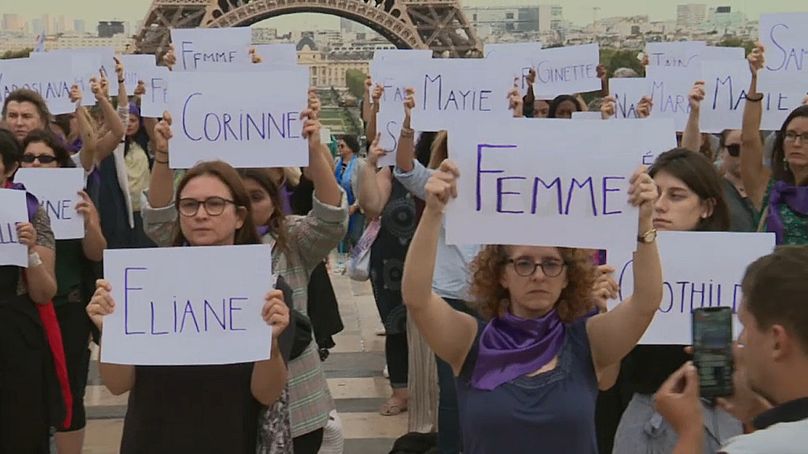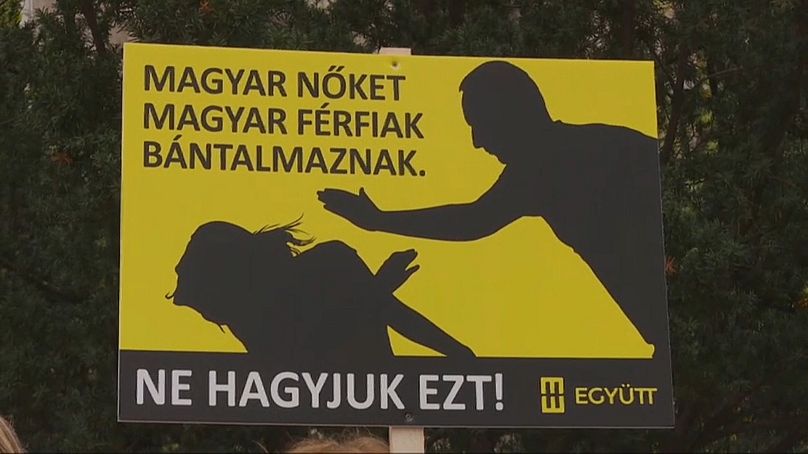Unreported Europe examines how the lockdown has led to a surge in domestic violence.
In this episode of Unreported Europe, Euronews' Monica Pinna examines how the lockdown has led to a surge in domestic violence.
Even in normal times one in three women are reported to suffer violent abuse from a partner, ex-partner or family member. On average, one hundred women in the world die every day - killed by someone they know. Eveline (not her real name) is one of the many victims.
"I was attacked by my ex-partner who came to my company's offices and said he wanted to kill me. He hit me with an axe handle violently on the head. There was blood everywhere. My brow bone was broken. I think I'm still alive thanks to my colleague. She was leaving, but she was still in the car park. She must have heard me screaming. She came up and maybe this stopped him. At one point, he told me I'm going to take you to hospital. I was scared. Honestly, I thought he was going to finish me in the car," she says.
Surge in violence
The lockdown is believed to have led to a huge explosion in violence with some countries reporting that abuse has risen by a third. Despite those estimates, it remains difficult to get a clear picture on how the pandemic has affected domestic violence in Europe as the data are not collected in a systematic manner.
In Italy, the country’s Interior Ministry reported 11 killings in 11 weeks of lockdown. 27-year-old Lorena - a trainee doctor - was killed by her boyfriend, a nurse, who accused her of infecting him with COVID-19. Meanwhile in Spain, four women were killed in lockdown making up the 20 so-called femicides recorded since January. Unofficial sources, however, say the figure is double that.
"When they called me, he had already been released."
Elsewhere in Europe, the association,"Féminicides par compagnons ou ex", in France keeps a record of killings. Since the beginning of the year around 40 women have died. Only about 20 percent of victims of domestic violence in the country are thought to file a formal complaint. Many of them say they don’t feel the authorities give them the support they need. Eveline's abuser was released two days after the attack, leaving him free to roam for one month before trial.
Euronews, Monica Pinna: "Have any concrete measures been taken to ensure your ex-partner will stay away from you?"
Eveline: "He is not allowed to approach me, or contact me in any way at all. But, other than that, it's just down to his goodwill. It's not enough."
Euronews: "Is there anything about the legal process that has shocked you?"
Eveline: "The voice of the victim is not heard, in any way whatsoever. Decisions have been made without warning me in advance, and once taken, without ensuring my safety.”
Euronews: "That he was freed without your knowledge?”
Eveline: "When they called me, he had already been released. Anything could have happened.”
France holds national debate
Last year the French justice ministry released a report on 88 murders or attempted murders. In 65% of these cases, the police were notified beforehand. France’s Justice Minister has admitted the system was dysfunctional.
"We do already have tools at our disposal. The problem is that there are a lot of complaints. There are a lot of legal paths that can be taken but very few people to deal with and respond to these complaints. There is a lack of human and material resources to protect abused people,” says Bénédicte Del Vecchio-Zinsch, a lawyer specialised in domestic violence.
Faced with a rising number of femicides, France saw a wave of public protests in 2019, and responded by having a national debate. The three-month open discussion between politicians and associations led to new measures being announced.
Further action was also taken during the recent lockdown. For instance, pharmacies are now a first port-of-call for victims, who can use code words to ask for help. It remains unclear, however if the move has worked.
Veronique Nouri, the head of the Chemists' Union in the southeast Rhône region says she's had nobody come into her pharmacy asking for help.
"In my pharmacy, we’ve had no cases. I asked my colleagues in the Rhône and they had none either. It’s amazing that no pharmacies have had any cases, because I think there should have been. Have they just not dared to come in?”
Reception points have also been set up in some supermarkets across France. In the Lyon region only one of these was opened. Despite still being on the Government’s website, it was not only difficult to find but closed as soon as the lockdown was lifted.
Hotlines overwhelmed
In contrast, charity hotlines say they have been overwhelmed. The women's rights group VIFFIL received over one thousand calls during the seven week lockdown in Lyon. It says 230 women had never contacted the association before.
"There are not enough emergency shelters for women, explains Elisabeth Liotard, VIFFIL's Director. She adds: "Nevertheless, during lockdown, many resources were made available by the state, regions and individuals. The state has opened 60 extra units for women who are victims of domestic violence. So, we did have some solutions, which we don't have usually. If 10 flats became available today, I think we would have ten women who would move out of their home. This means, during normal times, some women just stay at home, sometimes because there is no option in terms of accommodation."
Istanbul Convention to protect women
France is not alone. Across the world, the pandemic has highlighted that many women are not always safe at home.
In Europe, work to change legal procedures, improve police response times and increase services to keep women safe is accelerating. 34 member states of the Council of Europe have already ratified the Istanbul Convention, which provides a comprehensive list of measures to protect women.
"In recent years, we've seen quite a wide change in national legislation, more and more specific criminal offences being introduced," says Johanna Nelles, Executive Secretary to the Istanbul Convention of Europe. She adds: "In many states, parties to the Istanbul convention, there has been a real process of assessing whether funding is sufficient, whether services are sufficient or whether new services need to be set up. So many countries are now introducing sexual violence services that did not exist before."
Hungary refuses to ratify
Despite the pressure brought on by the pandemic, Hungary followed in the footsteps of Bulgaria, Slovakia and Latvia and refused to ratify the Istanbul Convention.
The country’s parliament recently backed the government's position that the Convention promotes "destructive gender ideologies" and "illegal migration". While Budapest says it agrees with the substance of the Convention, it insists it doesn’t need it.
“These institutions and measures exist already in Hungarian law. They work - most of them were created by our government. In addition, most of the time, these laws go far further than what is required under the Istanbul Convention.”announced Gergely Gulyás, head of the Hungarian Prime Minister's Office.
The NANE women's rights association has held several demonstrations in support of the Convention, which Hungary signed in 2014.
"The Istanbul Convention could mean a comprehensive approach against domestic and sexual violence. It is a big loss that instead of this, there are only "ad hoc", isolated efforts to handle the problem," argues Györgyi Tóth, NANE.














